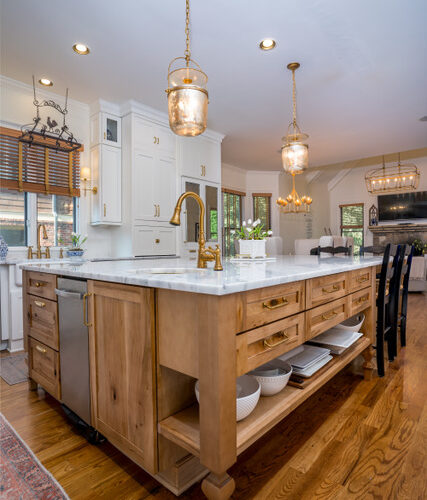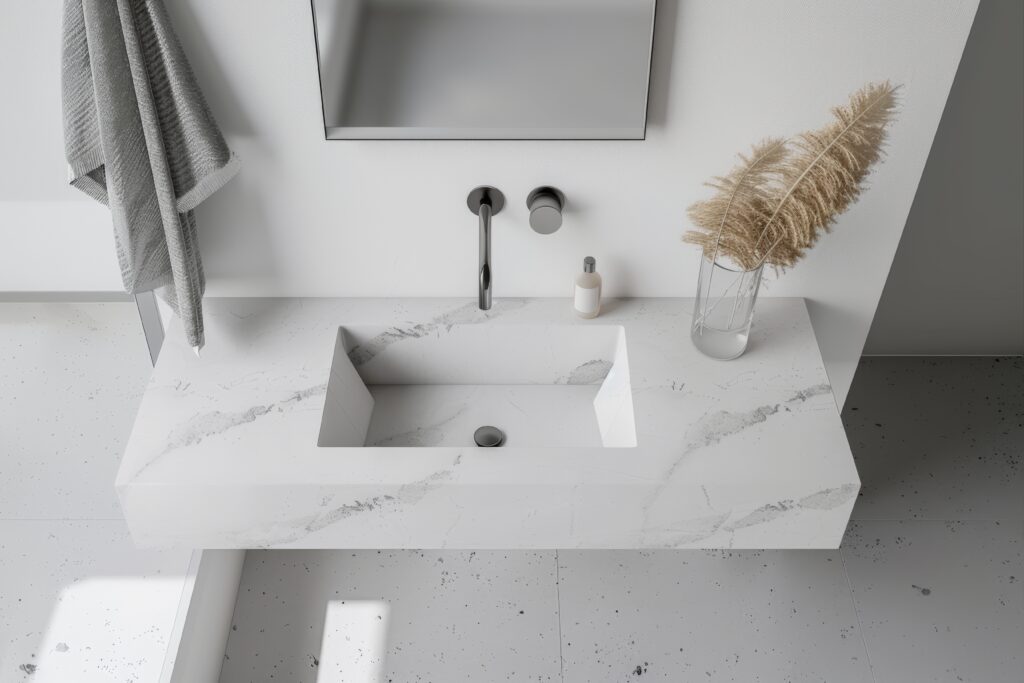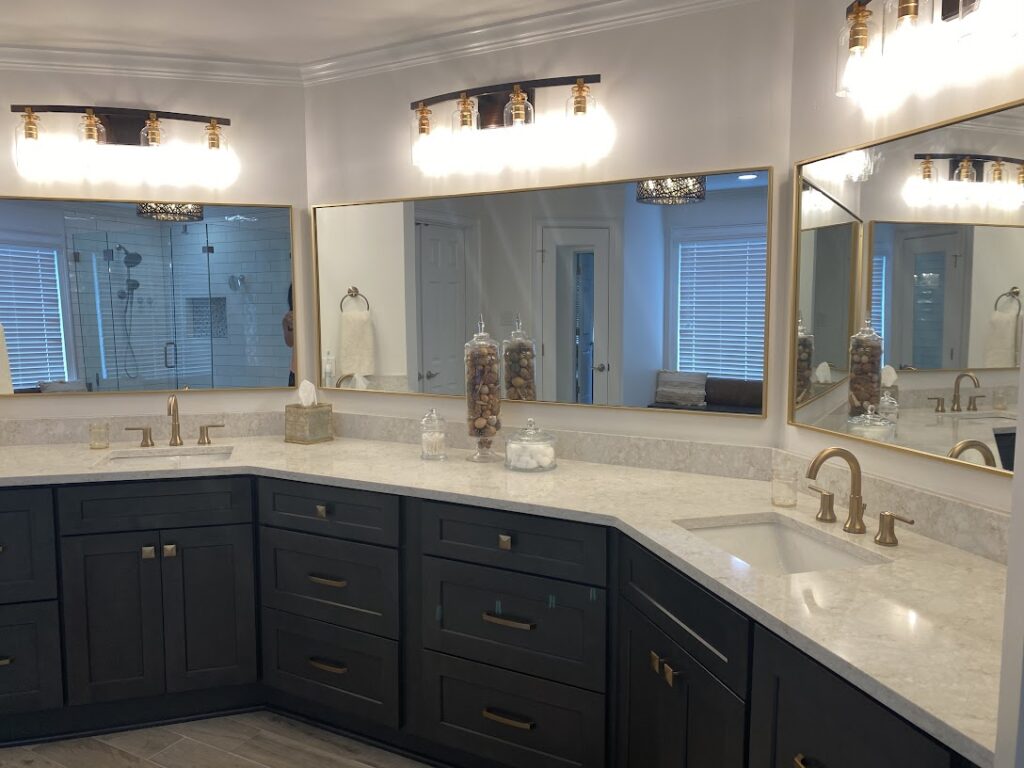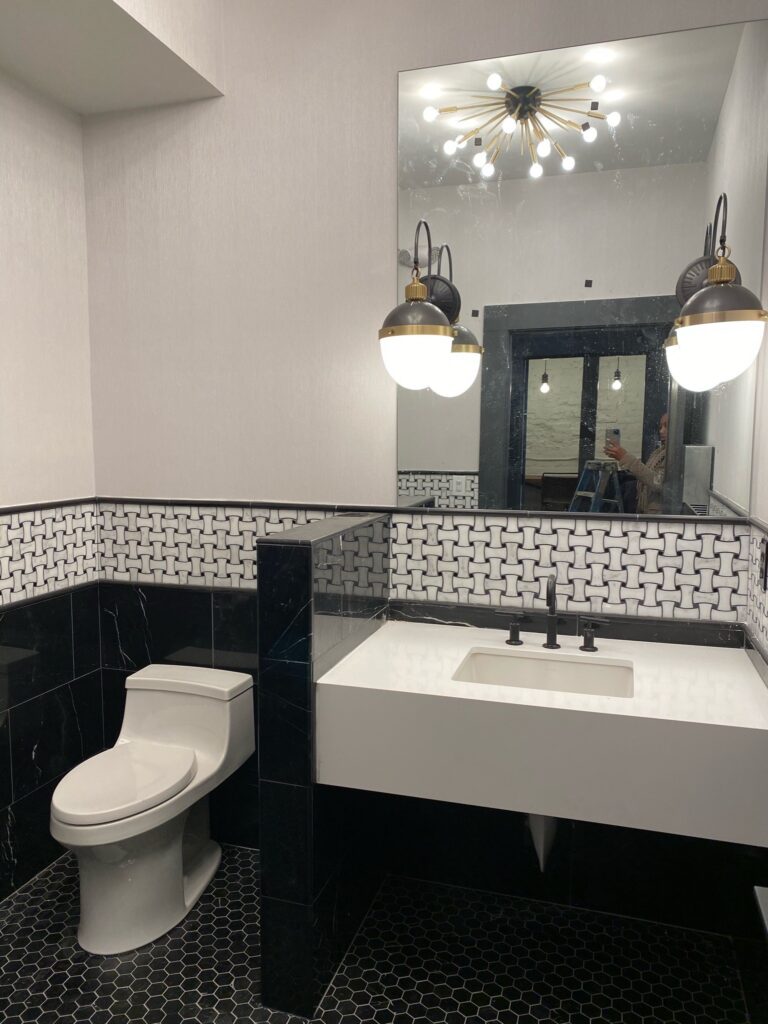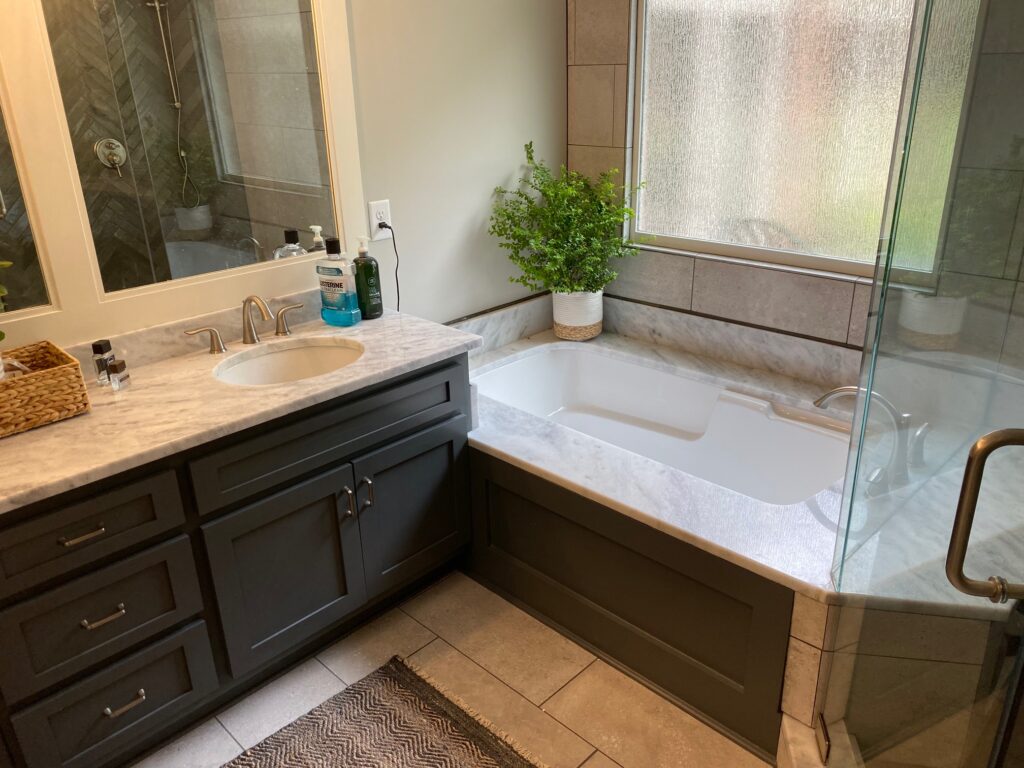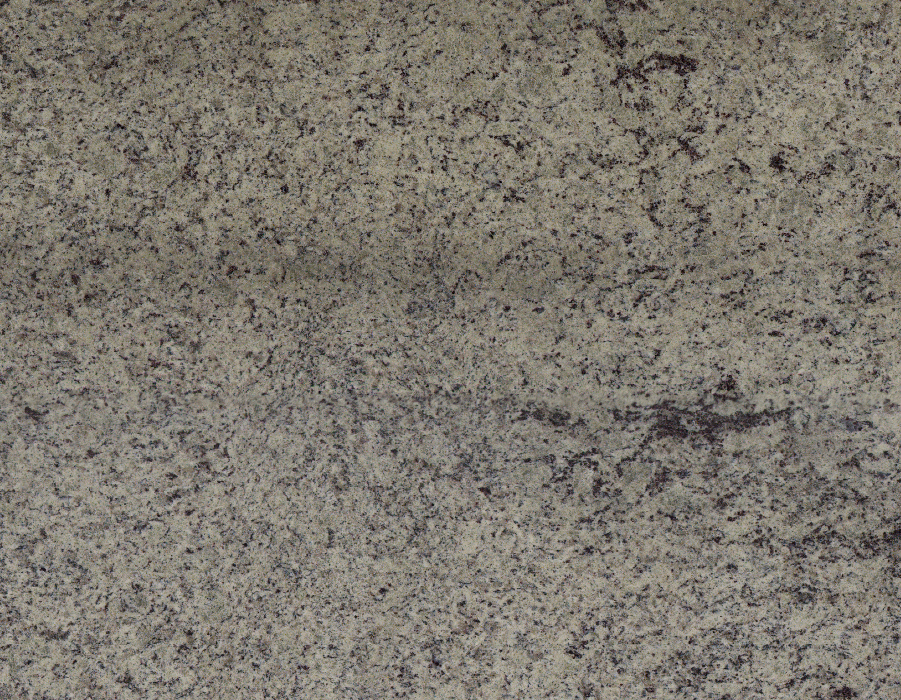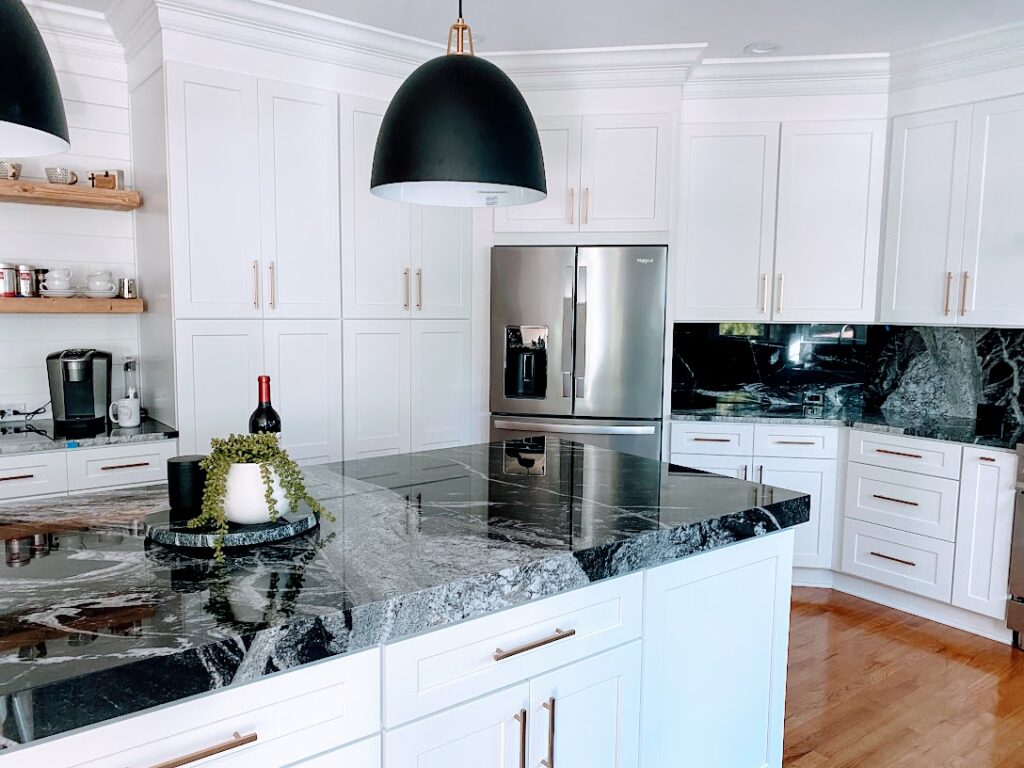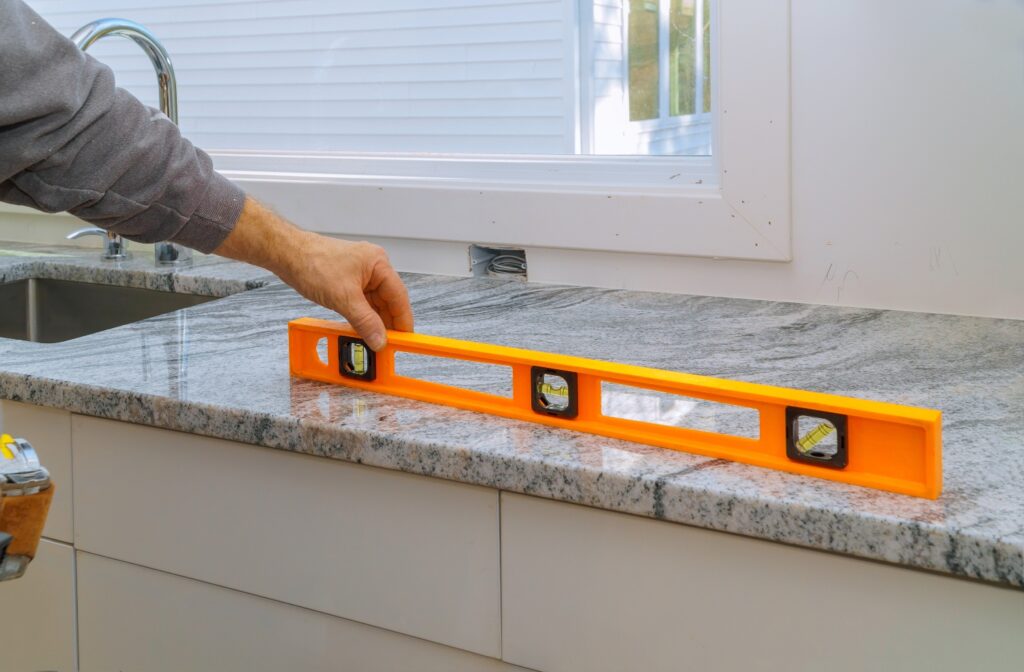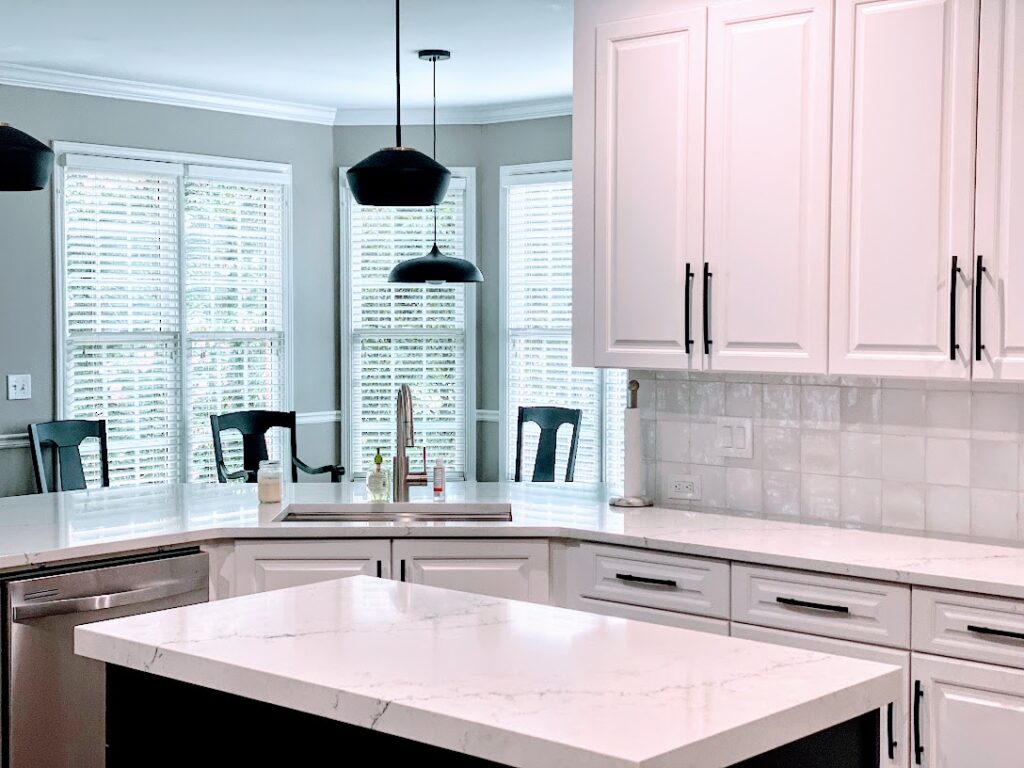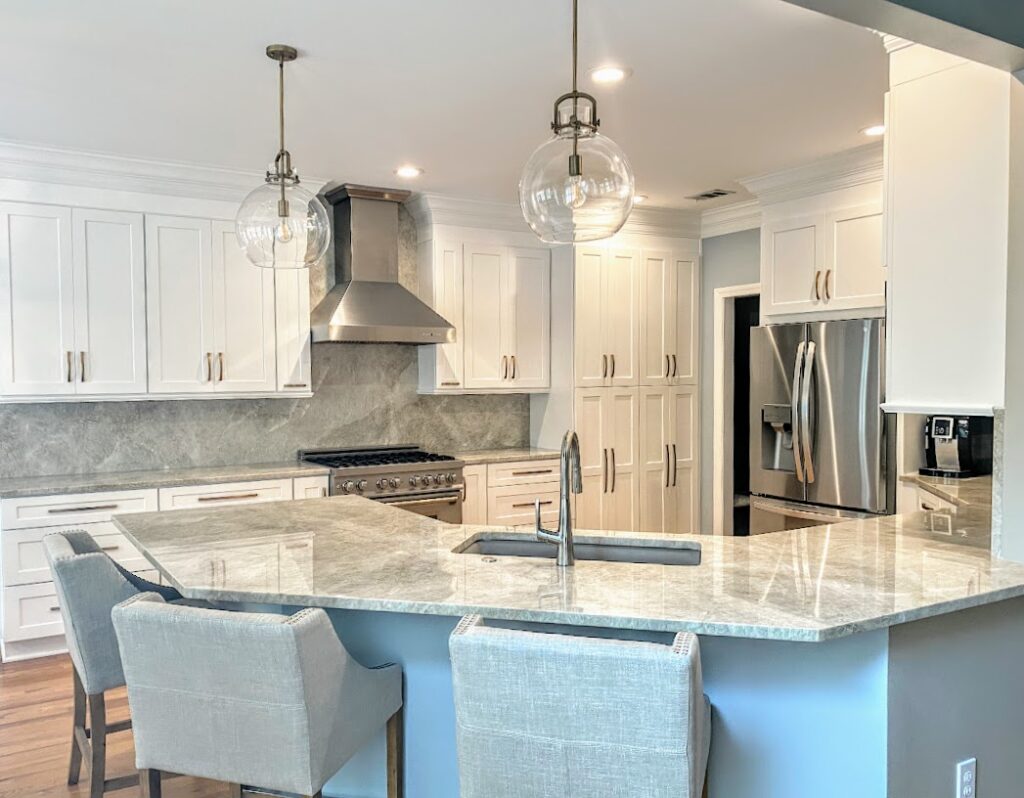Quartz Countertops vs. Marble Countertops
When deciding between quartz and marble countertops, you’re faced with a choice that balances practicality and elegance. Thanks to its engineered composition, Quartz offers a robust, low-maintenance option, while marble captivates with its timeless beauty and natural veining. Each material has its strengths and challenges, from durability to maintenance requirements. But there’s more to consider—what about cost implications or the environmental impact of your choice? As you weigh these factors, let’s explore which countertop could be the perfect fit for your kitchen, ensuring it meets both your aesthetic desires and functional needs.
Material Composition
When you’re choosing between quartz and marble countertops, understanding their material composition is crucial.
Quartz countertops are engineered stone surfaces. They comprise about 90-95% ground natural quartz mixed with polymer resins and pigments. This combination results in a durable and non-porous material resistant to stains and scratches. The manufacturing process allows for a wide range of colors and patterns, giving you more flexibility in design choices.
Quartz’s engineered nature means it doesn’t require sealing, making it a low-maintenance option for busy households.
On the other hand, marble is a natural stone, formed from limestone and subjected to high pressure and heat for many years. This process results in the beautiful veining and unique patterns that marble is known for.
However, marble is a natural stone and porous, making it susceptible to staining and etching from acidic substances. You’ll need to seal marble countertops regularly to protect them, and even then, they require careful maintenance to preserve their beauty.
When considering quartz, you opt for a reliable and consistent material that combines natural quartz with modern technology. Its uniformity and resilience make it a favorite for many homeowners.
Marble offers a classic and timeless look, but due to its natural composition, it demands more care. Understanding these fundamental differences in material composition helps you weigh the practicality and maintenance needs of each option, ensuring you make an informed choice that aligns with your lifestyle and priorities.
Aesthetic Differences
Now that you’re familiar with the material composition of quartz and marble countertops let’s explore their aesthetic differences.
When you think about marble, what likely comes to mind is its classic elegance and natural veining that adds a touch of sophistication to any space. Each marble slab is unique, showcasing intricate patterns that can range from subtle to bold, depending on the origin and type of marble you choose. This natural variation can make your countertop a true statement piece, often sought after for its timeless beauty.
Quartz countertops, on the other hand, offer a different kind of appeal. Since they’re engineered, quartz allows for a consistent look across slabs, which can be an advantage if you prefer uniformity in design.
You can find quartz in a wide array of colors and patterns. Some mimic natural stone, including marble, while others offer bolder, modern designs. The ability to customize the appearance of quartz countertops means you can choose something that perfectly aligns with your personal style and the overall aesthetic of your home.
The choice between quartz and marble often comes down to your design preferences. If you cherish the idea of natural, one-of-a-kind artistry, marble might be your go-to. If you’re drawn to versatility and sleek, consistent patterns, quartz could be your match.
Either way, both materials offer a level of sophistication that can elevate the look of your kitchen or bathroom, providing a luxurious touch to your living space.
Durability and Longevity
Durability and longevity are crucial factors when choosing between quartz and marble countertops.
Quartz countertops, made from engineered stone, are renowned for their impressive durability. They resist scratches and chips remarkably well, making them a reliable choice for busy kitchens where knives and heavy pots are frequently in use. Because quartz is non-porous, it doesn’t absorb liquids, reducing the risk of staining and bacteria growth. This attribute significantly contributes to its longevity, maintaining its appearance and structural integrity over time.
On the other hand, marble countertops, crafted from natural stone, offer a classic and elegant look but require a bit more caution. Marble is softer and more porous than quartz, making it susceptible to scratches, chips, and stains. Acidic substances like lemon juice or vinegar can etch its surface, leaving dull spots. This vulnerability can impact its longevity, as regular exposure to such elements may gradually deteriorate its beauty.
However, don’t let these considerations completely deter you from choosing marble. With mindful usage and a little extra care, you can still enjoy its timeless charm for years. Marble countertops develop a unique patina over time, adding character to your kitchen that some homeowners find appealing.
Ultimately, your decision should align with how you use your kitchen. If you prioritize a countertop that withstands heavy use and retains its appearance with minimal effort, quartz is your best bet. If you value the natural beauty and are willing to treat it with care, marble can offer a stunning, albeit less resilient, option.
Maintenance Requirements
Maintaining your countertops is essential to preserving their beauty and functionality. When choosing between quartz and marble, it’s crucial to consider how much time and effort you’re willing to dedicate to their upkeep.
Quartz countertops are known for their low-maintenance nature. They’re non-porous, so you won’t have to worry about sealing them periodically. This means they more effectively resist stains from common household items like wine, coffee, and oils. A simple wipe with mild soap and water does the trick for daily cleaning.
Avoid harsh chemicals or abrasive pads, as they can damage the surface. Quartz also doesn’t require polishing, making it a fuss-free option for busy households.
On the other hand, marble countertops demand more attention. Being a porous stone, marble is susceptible to staining and etching from acidic substances like lemon juice or vinegar. To protect your marble, you’ll need to seal it regularly, typically every few months, depending on usage.
This helps to prevent liquids from penetrating the surface and causing discoloration. Cleaning marble involves using a pH-neutral cleaner and soft cloths to prevent scratches. It’s important to quickly wipe up spills and avoid placing hot items directly on the surface, as this can cause damage.
Cost Comparison
When considering the cost of quartz versus marble countertops, it’s important to weigh both initial expenses and long-term value. This price includes not just the stone itself but also the complexities of cutting and installing natural marble.
Marble’s luxury appeal and unique veining can increase the price, especially for rarer types or custom designs.
On the other hand, Quartz is engineered, which means manufacturing is more controlled, and prices can be consistent. This engineered nature allows for a wide variety of colors and patterns, mimicking the beauty of natural stone while maintaining a more predictable pricing structure.
Long-term value is another crucial aspect to consider. As a natural stone, marble is more susceptible to scratches, stains, and etching. This can mean higher maintenance costs over the years, as you’ll need to seal marble regularly to protect its surface.
Quartz, however, is non-porous and highly durable, reducing the likelihood of additional expenses for repairs or maintenance.
Ultimately, while quartz might appear more expensive initially, its durability and low maintenance often translate to cost savings. So, when you’re deciding between quartz and marble countertops, think about not only the upfront price but also the long-term financial implications of your choice.
Balancing these factors can help you make a decision that aligns with your budget and lifestyle.
Environmental Impact
Evaluating the environmental impact of quartz and marble countertops involves looking at their sourcing and manufacturing processes. When you choose a countertop, it’s essential to consider how these materials are extracted and turned into the surfaces you might install in your home.
Marble is a natural stone sourced directly from quarries. The extraction process involves significant energy use and can result in habitat disruption, air pollution, and landscape alteration. Moreover, transporting this heavy stone from quarries to processing facilities and then to your home, adds to its carbon footprint.
However, marble is biodegradable and can be recycled as a natural material.
On the other hand, quartz countertops are engineered, meaning they’re made from a combination of natural quartz crystals and synthetic resins. While quartz is abundant and doesn’t require quarrying like marble, the manufacturing process involves energy-intensive equipment and non-renewable resins.
These resins can contain chemicals that may not be environmentally friendly. However, quartz countertops are highly durable, reducing the need for replacement and lessening waste over time.
When considering the eco-friendliness of both materials, think about the long-term impacts, too. Marble might have a higher upfront environmental cost, but it doesn’t involve synthetic materials.
Quartz, while initially more energy-intensive to produce, is incredibly durable and often has a longer lifespan. By weighing these factors, you can make a more informed decision that aligns with your environmental values.
Installation Process
Installing quartz or marble countertops involves careful preparation and skilled craftsmanship. First, you’ll need to ensure your cabinets are level and can support the weight of the countertop material. Since both quartz and marble are heavy, any instability could lead to issues later. It’s smart to double-check all measurements for accuracy before you proceed.
When dealing with quartz, you’ll appreciate its uniformity, which makes cutting and fitting slightly easier. Still, precision is crucial. You’ll start by dry-fitting the pieces to confirm they align perfectly. Once you’re satisfied, apply adhesive to secure the quartz slabs in place. Remember, quartz is non-porous, so sealing isn’t necessary, saving you a step.
Marble, on the other hand, requires a bit more attention during installation. Its natural veining means each piece is unique, so matching patterns at seams can be challenging. You’ll likely need a professional to cut and polish the edges for a seamless look. After positioning, apply a high-quality adhesive and ensure it’s well-supported.
Don’t forget marble needs sealing to prevent staining and moisture damage.
Both quartz and marble installations benefit from professional expertise, especially for cutting and handling. While DIY might seem tempting, any mistakes can be costly. Professionals have the tools and experience to manage these challenges effectively.
Once installed, both materials will enhance your space, but remember to follow maintenance guidelines to keep them looking their best. Proper care will make your countertops a beautiful and functional addition to your home.
Frequently Asked Questions
Are Quartz or Marble Countertops Better for Allergy Sufferers?
You need a surface that’s non-porous to minimize allergens. Choose materials that don’t harbor dust, mold, or bacteria. Clean regularly to ensure a safe environment. Prioritize easy maintenance to keep allergens at bay effectively.
How Do Quartz and Marble Countertops Affect Home Resale Value?
You want to boost your home’s resale value, so focus on countertop materials that appeal to potential buyers. Choose durable, low-maintenance options. They often increase a home’s marketability, making it more attractive and potentially raising offers.
Can Quartz or Marble Countertops Be Customized With Unique Patterns?
You can customize countertops with unique patterns. Quartz offers a wide array of designs through engineered processes. Marble, being natural, showcases unique veining. Both provide opportunities for personalized aesthetics, enhancing your kitchen or bathroom’s visual appeal.
Are Quartz or Marble Countertops Suitable for Outdoor Kitchens?
Both quartz and marble countertops have drawbacks outside. Quartz can discolor in direct sunlight, while marble may weather over time. If you’re set on using them, ensure they’re under cover or pick a more durable material.
How Do Quartz and Marble Countertops React to Chemical Cleaners?
You’re wondering about chemical cleaners’ impact. Quartz handles them better, resisting stains and etching. Marble is more sensitive; acids can damage its surface. Use mild, pH-balanced cleaners for both to maintain their appearance and longevity.
Conclusion
When choosing between quartz and marble countertops, consider your priorities. If you want durability and low maintenance, quartz is your best bet. It’s non-porous and effortlessly resists stains and scratches. On the other hand, if you cherish classic elegance with unique veining, marble’s beauty might win you over despite its need for regular sealing and maintenance. Consider what’s more important: practical durability or timeless aesthetics, and let that guide your decision.

Val Carvalho is a manager at Atlanta Stone Creations, with nearly two decades of experience in the stone and design industry. In addition to her leadership role, Val plays a key part in sales and design, bringing creativity, precision, and a strong sense of style to every project. Known for her warm and collaborative approach, she builds strong relationships with both her team and her clients. Val is passionate about delivering beautiful, high-quality results and creating an exceptional experience from start to finish.

